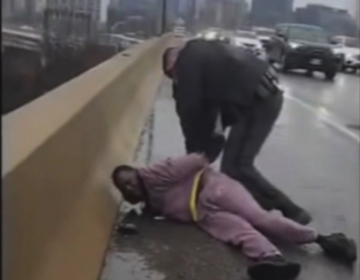Commonwealth: Despite federal judge’s recommendation, William Barnes should not be freed
Attorneys for the commonwealth filed a 23-page “objection to the report and recommendation” of a federal judge who maintained a 76-year-old man who remains imprisoned on technical parole violations a year and a half after being cleared of killing a Philadelphia police officer should be immediately freed from custody.
William Barnes served 18 years in prison after shooting police Officer Walter Barclay who happened upon an attempted burglary at an East Oak Lane beauty salon in 1966.
When Barclay died in 2007, then-District Attorney Lynne Abraham had him re-arrested and charged with murder.
Though a jury found Barnes not guilty of those charges three years later, Barnes has remained imprisoned on an evolving list of parole-board denials related stemming from the fact that he had a cell phone and car keys when he was arrested while working at a Roxborough supermarket.
U.S. Magistrate Judge Timothy R. Rice issued a scathing condemnation of those reasons for keeping Barnes imprisoned (PDF), focusing on the grounds that it defies a jury’s not-guilty verdict. Rice also noted that the Parole Board has denied his release on grounds that they previously approved.
The commonwealth response
In a Tuesday afternoon filing, attorney Chad L. Allensworth of the Pennsylvania Board of Probation and Parole’s office of general counsel maintained it did not violate “Barnes’ right to substantive due process when it refused him parole.”
It also maintained that “prisoners have no right to parole under the United States Constitution. … It has long been established that an inmate whose parole has been revoked has no constitutionally protected right to be paroled again.”
“Although Barnes clearly persuaded the Magistrate Judge that he deserved to be paroled, that is not the standard for federal habeas review of a parole refusal,” the objection read, listing various reasons for refusal including Barnes posing “an unacceptable risk to the community.”
The filing concluded that should the District Court accept Rice’s recommendations, “the appropriate remedy is an order remanding the case to the Board to review Barnes for reparole again with specific instructions.”
In other words, it should send Barnes’ case to the Parole Board for reconsideration rather than free him.
Barnes attorney Sam Silver said they have two weeks to respond to this objection.
“We’re disappointed that the Board has chosen to file objections to the report and recommendations,” said Silver. “The Board still has the ability to correct this matter before the Distrct Judge rules on it. In the meantime, we will be filing our response within the 14 days allowed and we intend to do what we can to move matter to a conclusion as swiftly as possible.”
The backstory
The filing comes two weeks after Rice issued a 35-page recommendation that the state Board of Probation and Parole immediately release Barnes.
“If due process means anything, it means that the state may not punish an individual for conduct of which he has been acquitted,” Rice wrote. “Immediate release is the only remedy that will fully redress the constitutional violation at hand and ensure Barnes is subjected to no further arbitrariness or vindictiveness.”
At a Jan. 31 hearing on the matter, Barnes’s attorneys argued that after a jury found Barnes not guilty of killing Barclay — who died 41 years after Barnes shot him during a robbery attempt — assistant District Attorney Ed Cameron urged the Parole Board to keep Barnes, who was known as the “East Germantown Cowboy” back in the day, behind bars until he dies.
Rice concluded that subsequent parole denials “rose to the level of a substantive due process violation.”
WHYY is your source for fact-based, in-depth journalism and information. As a nonprofit organization, we rely on financial support from readers like you. Please give today.




